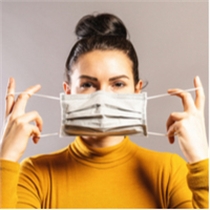
While wearing masks in public are critically important to prevent the spread of the coronavirus, they can also induce or aggravate various skin conditions including acne “maskne”, rosacea, eczema, and irritation dermatitis.
Fortunately, there are simple measures one can take to treat these conditions:
- For sensitive, easily irritated skin, wash with a gentle, fragrance free cleanser and apply a moisturizer immediately after washing. Ideally, the moisturizer should contain one or more of the following ingredients: ceramides, hyaluronic acid, dimethicone. It’s a good idea to use non-comedogenic moisturizers, especially if you have acne-prone skin. You can choose between gels, lotions, and creams (lighter to heavier respectively) based on whether your skin is oily, normal, or dry.
- If your skin is irritated, avoid chemical peels, exfoliants including salicylic acid, and retinoids that can exacerbate dry skin.
- Wear the correct mask the correct way. Two layers of a breathable material such as cotton is best. Avoid synthetics. Masks should be snug but comfortable. If the mask fits too tight or too loose it’s more likely to cause irritation.
- Remove your mask for 15 minutes periodically when in a safe place.
- Have a supply of masks to rotate wearing and wash masks after each use according to instructions. Use a fragrance-free hypoallergenic laundry detergent.
- If you have or develop acne, avoid wearing makeup. If necessary, use only products that are non-comedogenic (won’t clog pores). Continue the treatment plan from your dermatologist.
- For more information regarding selecting masks visit CDC.gov/coronavirus.


